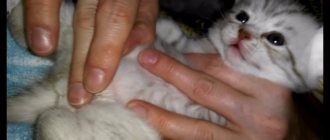The eternal question of cats' loyalty
Cat loyalty: myth or reality?
Such special cat devotion
Dogs are considered more loyal to their owners, but many cats are in no way inferior in devotion to humans, and are very afraid of losing him. Therefore, when a stranger comes to visit, or a child or other animal appears in the family, the cat may behave in a completely unfamiliar way.
A pet can easily rush at a guest, hiss at him, scratch him, and leave a bad mark in a variety of places. The thing is that cats are jealous, and when new faces appear in the environment of its owner, they are afraid that the owner will forget about them.
Cats are owners
From my own example, I can confidently say that cats are owners. When my “cat” family received an addition in the form of a little kitten Dolechka, the old-time cats, seeing how I stroked her and played with her, immediately began to deliberately climb onto the table, throw off keys, tubes of creams, chew wallpaper and create everything for which I scold them. As soon as Dolechka left my arms, the “mayhem” stopped, and they immediately lay down next to me and calmly dozed.
How does ailurophobia occur?
The course of this anxiety disorder is individual for each patient. Some ailurophobes may experience a panic attack when making visual contact with an animal. Others are calm about the presence of a feline in their field of view, but panic if the animal begins to approach, or if they come into physical contact with it. There are also particularly severe forms of fear of cats, when the fear becomes obsessive and constant. The patient is constantly afraid of meeting an animal; it seems to him that cats are chasing him and want to attack him.
Loud noises are scary for cats
Loud and harsh noises are another phobia for many cats.
And it’s all about the incredible sensitivity of their hearing, as well as the fear of objects that make unfamiliar and unpleasant sounds. As soon as I take out the vacuum cleaner, the cat immediately hides under the sofa or climbs onto the closet. Another cat, on the contrary, does not experience much discomfort at the sight of a vacuum cleaner, and even an electric drill will not force it to leave its heated place.
It turns out that the same sound and object are perceived completely differently by cats. If your animal is afraid of fireworks, thunder, hair dryers and other noisy phenomena and objects, you should not pull her out of hiding. If your pet prefers to sit under the sofa during a thunderstorm, let her sit, it will be much calmer, and it is possible that the fear will go away on its own.
The main reasons for cats’ fear of people and methods for correcting behavior
Do you scream, spank, swing or stomp on your pet? This is rude, aggressive and threatening behavior, if after such gestures the cat begins to be afraid and attack you - do not be surprised, you deserve it! If you want to correct the situation, start with yourself; it is not your pet’s fault that he is forced to defend himself and fear for his life.
Usually, in this case, cats are afraid of certain people, for example, veterinarians after undergoing surgery. Also included in this category are animals that have experienced rough treatment or bullying by their former owners. Animals that have experienced the horrors of existence in municipal shelters are usually also afraid of people who resemble former caretakers.
Of course, shelters and curators are different and sometimes four-legged animals are lucky to find themselves in a friendly atmosphere. However, if you decide to purchase a pet from a shelter, you should prepare in advance for possible difficulties. There are no special methods for correcting such fear, only affection, patience and no pressure on the psyche. Over time, the fluffy one will believe in your good intentions.
Cats are quite territorial, and it is important for them to have their own, safe place. If your furry friend physically cannot hide from guests or children, at first he will be under prolonged stress, then you will observe passive-cowardly behavior and only then will you feel anger on yourself.
By the way, a pet may worry about the inviolability of its territory and is not afraid of people, but it may take out its anger on bipeds. For example, seeing a cat outside the window, your ward will get angry at him, but will scratch you or your child. There is only one reason - the cat does not feel safe. Correct this and the behavior will return to normal.
If a cat is afraid of strangers, loud sounds, or other animals, this is due either to a lack of personal space or to a complex of self-doubt. To correct the behavior, you will need to do two types of work - equip a closed hole for the animal. In a small apartment, you can allocate space on the closet for your cat by first equipping a rigid ladder. When meeting guests, the four-legged dog must also be on top (in the literal sense of the word). Lots of options:
- Provide the ward with access to the highest points of the premises - cabinets, kitchen units, etc.
- Feed the cat at a high height from the floor. Moreover, if, towering above everyone else, the pet eats food in the presence of guests, this can be considered serious progress.
- Equipping safety palms is an installation with a wide and heavy “pancake” at the base, then a thick pole (like a scratching post, only tall) and at the top a platform that the cat can climb onto if it gets scared. Climbing a tree when threatened is the instinctive desire of the mustachioed striped species.
We suggest you read: Cataracts in cats, what to do. Cataracts in cats. What the owner needs to know
Are all cats afraid of water?
As soon as the water starts flowing in the bathroom, and I inform my pets that bath day has come, prepare towels and brooms, then by their behavior the cats communicate that they are not delighted with my idea. As a result, water procedures often end in stress for cats, and for me, bandaged hands.
It is believed that cats are afraid of water because their fur gets wet and deprives it of its warming function. But the fact is that there are hairless breeds living in my house, and they are terribly afraid of water. It turns out that the process of washing and water itself causes the main fear, and not the likelihood that the cat will freeze. In any case, I suggest you read the article why cats are afraid of water if you are interested in this issue and want to clarify it for yourself.
Causes of ailurophobia
Ailurophobia is a fear of cats at the pathological level. That is, not just hostility or dislike for cats, but a truly panicky, uncontrollable fear of these pets.
The cause of a phobia should be sought in the subconscious. Anxiety itself is a defensive reaction of the psyche to a stressor, which for some reason has taken the form of pathology.
Reasons for developing a fear of cats can be:
- Negative, traumatic incidents from the past associated with direct contact with the cat. For example, cases from childhood: a child wanted to play with a cute cat, but was scratched, bitten or scared by it. Since then, the baby has tried to avoid contact with cats. And over the years, fear took the form of a pathological anxiety disorder. However, not only physical injuries can be the cause. Sometimes the prerequisite may be a psychological factor not related to the animal’s aggressive behavior.
- Unpleasant associations associated with events after contact with a cat. For example, a child played with a kitten, but was scratched. The scratch became inflamed and festered. As a result, the child was punished by his parents for disobedience and a ban was imposed on playing with cats. Or he even had to go to the hospital and undergo unpleasant procedures - rabies injections, dressings, wound treatment. The cause may also be accidental infection with worms, lichen or other parasites from representatives of the cat family and long-term unpleasant treatment after. Such factors can firmly cement the “cat = danger” attitude in the subconscious, which subsequently leads to anxiety.
- Hyper-emotionality, excessive sensitivity and impressionability can also cause a phobia. A fear of cats can develop in an impressionable person who has not had a negative experience with them himself, but has heard about an unpleasant situation from other people or witnessed the incident personally. In particular, for some children, a negative opinion about animals from authoritative people (parents, close relatives) is enough for them to begin to be afraid of them or be prejudiced. Since children cannot yet judge objects objectively or evaluate any opinion critically, a negative parental attitude towards animals easily transforms into a phobia in them. The same can be said about people whose psyche is quite labile.
- Superstitions and signs largely influence the formation of ailurophobia. For example, the fear of a black cat is quite common among peoples around the world. It only takes one unpleasant incident in a person’s life after meeting an innocent creature with black fur to give rise to an anxiety disorder. Overly superstitious people tend to avoid cats. Such anxiety can easily become pathological under certain circumstances.
Ailurophobia is a specific anxiety disorder; it can occur and develop at any age: in young children and adults, even in older people. It also happens that a trauma experienced in childhood “surfaces” from the subconscious in adulthood and transforms into a phobia.
Cat and smells
Many cats simply jump away from the smell of lemon, nail polish, scented hygiene products, vinegar, etc. Strong smells irritate the cat's nasal passages, and the cat tries to avoid strong scents for fear of losing the ability to smell. It’s hard to call it a phobia - rather a natural reaction to something that is unpleasant.
For example, citrus fruits are a strong allergen for cats and have an extremely unpleasant odor for them. Is it any wonder that the cats will avoid him?
New in blogs
What are cats afraid of? Pets, June 28, 2013, 08:13, Photo: Legion-Media.ru
“Come out, you vile coward!” — I just want to exclaim after the cartoon mice when my Siamese cat, hearing the noise of the microwave, gallops out of the kitchen to hide somewhere under the cabinet. The cat, of course, is not timid, but even when the microwave turns off, he does not immediately return to the kitchen. He sneaks around, looking around warily, but at the same time, as if with all his appearance, he says: “I’m not a coward, but I’m afraid...” Surprisingly, cats, these independent and proud creatures, are afraid of a lot in our world. Owners should treat cat phobias with respect, because they do not arise out of nowhere. Read about the most common cat fears and their causes in this article on lady.mail.ru. As practice shows, cats, lovers of comfort, coziness and tranquility, cannot stand sudden loud sounds, unpleasant noises, or sharp rumbles. This is a typical acousticophobia or phonophobia. Many cats perceive a thunderstorm with clap of thunder, festive fireworks and explosions of firecrackers, the sound of a jackhammer or the “squeals” of an electric drill as an apocalypse. Some of them, during an everyday “cannonade,” may rush around the room in panic, looking for a secluded place where they can survive all this horror. Every day, cats encounter many other sounds - tools, household appliances and technology - that make them nervous. Some cats are afraid of a vacuum cleaner, others cannot stand a hairdryer turned on, others cannot stand a mixer... If, in fear, a cat hides under a closet or behind a sofa, you should not try to lure it out of its “shelter” - let it calmly sit out the commotion there. The cat has every right to do this! Her ears have incredible sensitivity: for a cat, a working vacuum cleaner, drill or hair dryer is like for us an airplane flying just a few meters from the house. How could it not be scary? Some experts believe that cats are afraid not so much of loud sounds as of the objects themselves that make them, so sometimes they may not run away from “monsters”, but, on the contrary, bravely attack them.
No alcohol law
A very common fear among cats is hydrophobia - the fear of water. And this despite the fact that cats swim well. But, be that as it may, some cats perceive the owner’s attempt to drag the pet into the bathtub for water treatments as a declaration of war, and therefore immediately use their teeth and claws.
The cat may not break out during washing and stoically endure the procedure, but this does not mean that she likes it. She knows what awaits her after this... Unlike a dog, which can happily run through the water, shake itself off and dry quickly, a wet cat will take a long time to dry, look poor and unhappy, tremble and diligently lick itself. It's all about the special structure of cat fur, the high thermal insulation of which is provided by hairs that can hold air, forming a protective layer. Water falling on the wool displaces the air “layer” and deprives the fur of its warming function. A wet cat quickly freezes, and then cannot warm up for a long time - until it dries completely. This is a good reason why cats are afraid of water.
It smells like kerosene
Not only water, but also the smells of shampoos with various perfume additives make cats fear the bath day. From the point of view of cats, hygiene products that smell fragrant with aromas simply smell disgusting. They are not for their sensitive sense of smell! Most cats cannot stand the smell of paints, varnishes, glues and other chemicals. Many of them are terribly afraid of the smell of citrus fruits - lemon, grapefruit, lime, orange. Such pungent odors irritate the cat's nasal canals, which the cat takes great care of - after all, having lost the ability to smell, she may die. Most cats cannot tolerate the smells of vinegar, alcohol, alcohol, and medications (except, perhaps, valerian).
It is interesting that, according to one hypothesis, cats’ premonition of certain cataclysms, such as cyclones and volcanic eruptions, is associated precisely with the structure of its nose. It is believed that the cat is able to distinguish the smells of the smallest particles of dust and volcanic ash that have not yet escaped into the open air.
Scary and terrible... Aibolit
Cats experience antipathy and fear not only towards medications, but also towards those who prescribe them - veterinarians. Going to a veterinary hospital becomes a real stress for many of them. While waiting for the reception, the pussy continually tries to sneak out of the container for transportation, and when you try to get it out of there, on the contrary, having huddled in a corner, it begins to resist. The fear of a doctor in a white coat, and even more of his hands in rubber gloves, sometimes causes inappropriate behavior, even aggression, in cats, even seemingly meek and docile ones. And it’s good if during such a violent reaction only Aibolit’s gloves suffer...
How to calm your pet in such a situation? First of all, the owner himself must stop worrying. The animal senses his mood, and if the owner is not nervous and anxious, then the cat will behave calmer. And, of course, during the examination or procedure you need to help the doctor hold the pet. In its own hands, the cat will feel much less in danger.
No entrance for unauthorized people
You can make TV series about how cats communicate with people, no worse than the Mexican ones. But one thing is clear: strangers, unknown people, are always suspicious figures from whom one should not expect anything good. Their visits may well frighten the animal.
Hearing unfamiliar voices and seeing unidentified objects on the threshold of the apartment, the cat will hasten to retreat and hide in the far corner. There is no point in dragging her by force to the viewing. It is better to take things slowly, gradually accustoming your cat to new people. For example, to begin with, you can choose a place for her from which she can watch both you and strangers, and at the same time feel safe, as if no one is watching her. An excellent option would be a place on the closet where the cat can keep an eye on what is happening from above. This will give her the opportunity to study the guests on her own. It is also worth keeping in mind that fear at the sight of a stranger can sometimes turn into aggression, and then a coward with a tucked tail and flattened ears will in the blink of an eye turn into an angry fury with raised fur, ready not only to defend itself, but also to attack, using its teeth and claws.
In addition, according to the famous American veterinarian Michael William Fox, there are cats that simply do not like to be in close contact with people. The reason for such unsociability is innate temperament. And there is no way out: the owners will simply have to come to terms with the cat’s misanthropy. It is also interesting that congenital shyness or wildness only appears when the cat outgrows childhood. Therefore, if your kitten is friendly and sociable, you should not rush to conclusions about his philanthropy - everything can still change.
A stranger among his own
It's not just strangers that can instill fear in a cat. It happens that some cats do not have good relationships with one of their family members. And this is a rather serious problem, since, being under the same roof with the “enemy”, the cat will be constantly nervous and afraid. As a rule, the reason for fear of a person from the home environment can be rough play or cruel punishment for some offense.
A slap with a slipper or a tug by the scruff of the neck - cats cannot forget and forgive such offensive punishments for a long time. Fear can instill in a proud animal if the owner often forces the cat into contact and forces it to endure caresses for which it is not inclined. In addition, a cat can often be frightened by children who, while playing, begin to hold it in certain places (in chests of drawers, tables, boxes, etc.), tie rattles to it, etc. Such an incorrect attitude on the part of some household members can not only increase the feeling of fear of them, but also cause psychological trauma to the cat, which will cause it to become severely depressed. It will be difficult to establish friendly relations with the animal later.
But, of course, you can stop being the Scarecrow in the eyes of your pet. The first thing to do is to refuse any punishment. Secondly, do not force the cat into contact. Thirdly, you should talk to her more often in a calm and gentle voice, give her food and treats. In addition, a family member who instills fear in a cat should not do things that are scary from the cat's point of view, such as vacuuming the carpet. It is better to shift this responsibility to another family member for some time. And, of course, it’s worth trying to play her favorite games with your cat. For her, playing is the best therapy, thanks to which associations with unpleasant incidents will gradually be forgotten and the feeling of fear will go away.
What is your cat afraid of? Author: Tatyana Berezovskaya
Meeting with a veterinarian
Just as children are afraid of doctors, cats are afraid of veterinarians.
Fear of the veterinarian is an individual phobia. I have had to take my pets to the vet, and each of them reacted differently to the doctor. Some growled and covered their ears, some remained indifferent, and some even purred.
Once, I had to give vitamin injections to cats myself, which is a rather unpleasant procedure. The injection had to be made in the muscle of the back leg. At the sight of a syringe, the pets ran away like cockroaches, but after the course of treatment they completely calmly allowed us to stroke and touch any part of their body. But here is one cat, which has a calm and affectionate character, and still, if you even lightly touch his back leg, he becomes crazy, aggressive, rushes and hisses.
Big scary green cucumber
You may have seen a video where cats are terrified of a cucumber that suddenly appears behind their back. Such fears are rather a myth. The stars of these videos might as well be afraid of other objects. And the version that a cucumber may remind them of a snake is just assumptions and speculation.
Unsuspecting cat freaked out by cucumber from CucumbersScaringCats
How to rid a cat of fears
How how? You need to love your Mustache, first of all! You are unlikely to be able to eliminate many cat fears, but you can let your pet know that what he is afraid of is completely safe. For example, if a person unfamiliar to the cat comes to your house, give the guest the animal’s favorite treat so that when he enters the doorway, he treats the cat to it. There is no need to rid your cat of its fears by intimidation. For example, many owners, in order to rid the animal of its fear of the vacuum cleaner, begin to deliberately bring frightening household appliances to the animal.
If your cat’s fears somehow bother you, then you can take the animal to a cat psychologist, or better yet, invite it into your home so that the specialist can see the full picture of the animal’s fears and give valuable advice.
Insufficient socialization
You bought a kitten, no guests came to you for half a year, but then a celebration happened. The arriving people threw the cat into a panic; she hid under the sofa, screaming and trembling. Firstly, you made a mistake by not socializing the animal as a child; in fact, the cat only knows you and fear of guests is a normal reaction. Secondly, you can help your pet by placing him in a separate room, letting him hide and closing the doors - in the midst of the celebration, this option is optimal.
Many cat owners prefer not to work with such behavior, justifying it by saying that the cat does not have to love everyone. The truth is that a pet really doesn’t have to love anyone, but fear is stress and therefore harmful to the body. Socialization of an older animal is carried out gradually, at first, with the use of sedatives.
Invite one guest once a week and do not rush things; the ward must take the initiative himself and go out to the stranger. It’s not bad if the guest brings a gift or a toy for the pet. Give the cat a treat or toy from your hands, that's enough. By sensing the smell of a stranger and associating it with positive emotions, the tailed one will become a little more confident. The following method produces faster results:
- The role of the guests is played by a close friend (whom the cat has seen before) or a family member.
- Place your ward in the carrier, place the “house” in the room where you will receive guests and cover it with a thick towel. The four-legged animal should be able to look through the mesh, but not be visible to people.
- Act out the scenario - the doorbell rings, “Hello, I’m glad to see you, come in.”
- Even if there is noise from the carrier, you do not react, but if the cat screams, the carrier must be moved to the next room or corridor. The cat should hear people, but not see.
- If the pet behaves quietly, stay for 20–30 minutes and complete the scenario, take the guest to the door, and after 10–15 minutes open the carrier.
- Having rehearsed a little, after the staged arrival of the guests, we carefully place a bowl of goodies in the carrier. At first, the cat will not touch the treat, but later it will start eating. This can be considered a victory, because animals only eat when they feel safe.











